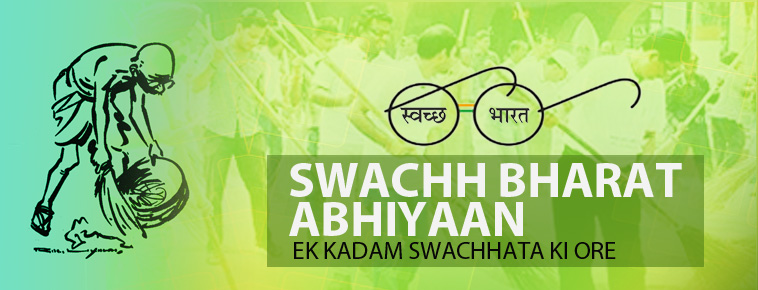Dr. Priyanka Gupta*
Introduction
An essential obstacle in the pursuit of sustainable urban growth is efficient garbage management. India is one of the fastest-urbanizing countries in the world. Its growing problems with solid and water waste pose threats to the environment and public health. In response, the Swachh Bharat project shines as a ray of hope, setting the standard for revolutionary waste management techniques in metropolitan areas.
The Swachh Bharat Mission
The Swachh Bharat Mission (SBM), which was initiated by the Indian government in 2014, is a comprehensive nationwide program that aims to eradicate open defecation and promote cleanliness by October 2, 2019, which is Mahatma Gandhi’s 150th birthday. One of its main goals is to ensure sustainable sanitation practices and environmental protection while ensuring effective solid and water waste management in metropolitan areas.
Solid Waste Management
India’s urban areas produce enormous amounts of solid trash every day, which presents a major problem to local government officials. The SBM uses a variety of tactics to address this problem, such as efficient collection, transportation, and disposal techniques, as well as waste segregation at the source. Streamlining solid waste management procedures is greatly aided by programs like material recovery facilities, community composting, and door-to-door waste collection.
Segregation at Source
The foundation of the SBM’s solid waste management plan is encouraging residents to separate waste at the point of origin. Communities are given the ability to separate waste into categories that are biodegradable and non-biodegradable through awareness campaigns and instructional programs. This separation promotes effective processing and disposal, reducing contamination of the environment and optimizing resource recovery.
Community Participation
The promotion of community involvement and participation in trash management initiatives is essential to the Swachh Bharat Mission’s success. Local governments work with citizens, community organizations, and non-governmental groups to foster a sense of accountability and ownership for waste management procedures. Volunteer-led cleanup efforts, garbage awareness seminars, and cleanliness drives are examples of community-driven projects that inspire people to take action for a cleaner urban environment.
Infrastructure Development
A strong waste management infrastructure investment is essential to achieving the Swachh Bharat Mission’s goals. Municipalities are better able to manage and treat solid waste when sanitary landfills, waste-to-energy facilities, and decentralized composting units are constructed. These developments in infrastructure not only lessen the burden of waste accumulation but also open the door for environmentally friendly waste management techniques.
Water Waste Management
Apart from managing solid waste, the Swachh Bharat movement also prioritizes tackling the problems associated with managing water waste in metropolitan areas. There are serious concerns for the environment and public health when sewage and industrial effluents are disposed of carelessly and contaminate water bodies. The SBM aims to revitalize water bodies, improve sewage treatment capacity, and encourage sustainable water usage habits through creative interventions and policy initiatives.
Sewage Treatment
Maintaining the public’s health and the quality of the water depends critically on sewage being properly treated. There are concentrated efforts underway to improve the sewage treatment infrastructure in metropolitan areas as part of the Swachh Bharat Mission. Mitigating water pollution and boosting cleanliness are made possible by the building of sewage treatment plants (STPs), the installation of sewer networks, and the adoption of environmentally friendly sewage treatment technology.
Wastewater Reuse and Recycling
Understanding wastewater’s potential as a resource, the SBM promotes its recycling and reuse in a range of settings, including as industrial processes, irrigation, and groundwater recharge. ETPs are used to treat industrial wastewater in order to reduce the negative environmental effects of the waste. Initiatives that support decentralized wastewater treatment systems and rainwater collecting also help to conserve water and lessen the demand on the municipal water supply.
Behavioral Change
The promotion of a paradigm shift in social attitudes and behaviors regarding garbage disposal and water usage is essential to the Swachh Bharat initiative’s effectiveness in managing urban waste. Citizens are made aware of the value of conserving water and using appropriate waste management techniques through focused behavioral change initiatives. The sustainability of sanitation programs is ensured by teaching water-saving practices and instilling behaviors such as decreasing, reusing, and recycling waste. These measures also last beyond the mandate of the SBM.
Challenges and Future Directions
The Swachh Bharat project faces various obstacles in its pursuit of efficient urban waste management, even with its noteworthy advancements. Obstacles to the program’s goals include low public awareness, poor infrastructure, and institutional capacity issues. To tackle these obstacles, persistent governmental backing, heightened public involvement, and creative policy measures are required.
In the future, managing urban garbage will require the Swachh Bharat Mission to take a comprehensive and integrated approach that includes technical advancements, interventions for behavioral change, and stakeholder collaborations. Using cutting-edge technologies like data analytics, IoT-enabled sensors, and smart waste management systems can improve the efficacy and efficiency of garbage collection and processing processes.
Conclusion
India’s dedication to attaining sustainable urban growth and environmental care is demonstrated by the Swachh Bharat campaign. By means of its coordinated attempts in solid and water waste management, the SBM aims to provide urban environments that are healthier, cleaner, and more habitable for millions of people. Realizing the vision of a clean and sustainable future requires steadfast dedication and concerted action as the nation works towards achieving Swachh Bharat.


Leave a Reply